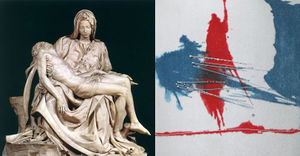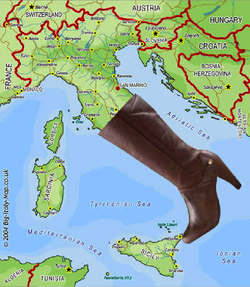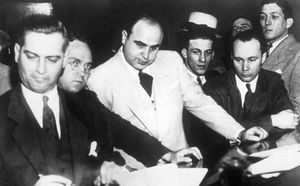Italy
The Land of Al Pacino La Repubblica dei Ristoranti Italiani | |||||
|---|---|---|---|---|---|
| |||||
| Motto: "Mamma mia! Tha's a spicy meat aball!" | |||||
| Anthem: Super Mario Theme Song | |||||
| Capital | Sicily | ||||
| Largest city | Little Italy | ||||
| Official language(s) | Italian Englisha | ||||
| Government | |||||
| National Hero(es) | Leonardo da Vinci Michelangelo Buonarroti Roberto Benigni Pinocchio Silvio Berlusconi | ||||
| Established | 17 March 1861 | ||||
| Currency | Euro | ||||
| Religion | Catholicism Pastafarianism | ||||
Italy (pronounced EAT-a-lee), officially the Italian Republic, is a country that is slightly better than France, located in southern Europe. Italy is an archipelago of two islands but also includes a small peninsula that juts off the southern European coast. Originally known as the Roman Empire, Italy is home to some of the most amazing engineering marvels including the Colosseum, a tower that's falling over, and a city run entirely on religion. Despite high prices, Italy continues to serve as one of the top tourist destinations for fine dining, visiting museums, and getting robbed by gypsies.
History
Roman Empire
Italy used to house the incredibly powerful Roman Empire, a place immortalised through Julius Caesar's conquests of modern-day France and southern England. Unfortunately, they were overpowered by a flock of Canadian geese in the early fifth century AD due to a migration caused by the fact no lifeform wants to spend any time in Canada. To this day, nobody knows who led the carnivorous birds to victory, but many claim it was a pissed off swan named Reginald.
Ancient Rome did contribute in several positive ways to human development. They invented the croissant and surprise abortions ("fetus deletus"). They also invented roads, many of which are still visible in the modern-day conquered lands, littered with homeless people and discarded children. Before Rome, people crawled around on the grass like primitive beasts, a bit like a Slipknot concert, making disconcerting grunting noises; something Julius Caesar once described as "a problemus". Luckily, Julius Caesar was able to civilise the barbaric tribes as he conquered Gaul, murdering the uncivilised nature out of them, afterwards standing resplendent above the mound of their corpses brandishing a falcon.
The Romans invented the Latin language, which has inspired almost every pan-European language since but is now exclusively used by "intellectuals" because they get turned on by pretension. Nobody actually understands Latin because it is simply a ploy to keep the poor people down as a statement that those pretending to understand it went to private school.
The Justinian Restoration
After the famous goose attack of 410 AD led by an enterprising swan, probably named Reginald, The Western Roman Empire was no more and the geese's brethren called the Ostrogoths occupied the territory, so named because they shared many characteristics with ostriches, hence why the geese were willing to work with them so readily. The Ostrogoths were not terribly good at kingdom management, however, and internal strife soon followed. Part of the reason for their lack of administrative expertise is because they had considerably long necks and spindly legs, but it's mostly because they had no hands with which to write to people to ask for taxes.
The emperor of the Eastern Roman Empire at the time, Justinian I, originally became famous with a pop music career of lacklustre, cheesily-written and adequately sung performances of his own music. This led people in the East to think he would be a strong and charismatic leader. However, he spent most of the time just singing "baby baby baby ooh" after attaining power and his subjects began rioting. A recent DNA test done on his mummified corpse compared against a strand of Justin Bieber's hair stolen while he was asleep confirms that yes, they are indeed related, however the power of the Canadian goose that was likely Justinian I's mother has been sufficiently diluted through the centuries such that Justin Bieber has a fraction of the bird's power yet all of the Canadian nationality – truly the worst of both worlds.
Pursuant to the civil disobedience in Italia, the Eastern Roman Empire (later called the Byzantines) decided to restore the province of Italia to its former glory by invading it because they really missed olives and opera music, further entrenching the international community's belief that Italy is just trolling them with their supposed "interests". The Eastern Romans were successful in conquering Italia but left it to rot shortly thereafter when the olives ran out and the geese attacked Constantinople.
Fascism
With a precedent set in the early 1930s, Italy became a fascist state run by their leader, Muscleini, an extremely large individual with unrivalled combat prowess and the ability to move at terrifying leg speeds. This is why he was often referred to as "the cheetah". Unfortunately, Muscleini was unable to inspire the same bravery and skill he possessed in his military officers, who were more interested in consuming pizza and discussing various cheeses in spider language than shooting English people in the face, which is a shame because there are far too many of them around.
Sadly for them, Italy's descent into fascism was unsuccessful and they were invaded by the British and US in 1943 as revenge for being marginally better at football. About the same time, Muscleini was lynched by an angry mob (and not the fun kind) over a disagreement regarding appropriate sauces to put on ravioli. People didn't really care that much because they were too busy being murdered by the allies and trying to block out the muffled screams of The Little Chef Massacre (not to be confused with the dozens of mass shootings that have presumably occurred in American Little Chef establishments since this was written – the chefs were just all dwarfs). Italy promptly surrendered following his death and diversified their economy away from spaghetti by inventing the risotto.
WWII
The Italian military in WWII was once described by the British general, Montgomery, as: "What?" – which is generally seen as the most positive review anybody has provided. They had a severe materials deficit and had to resort to outfitting aircraft and tanks with pasta as their munitions of choice. This was fairly ineffective due to the foodstuff's lack of density and its softness, its only real advantage being relative abundance to other raw materials required for war such as oil, steel and toast. However, as the war progressed, the research and development teams conscripted to solve this complex problem, formed of the greatest minds in the country, realised the issue was that they were boiling it before loading it into their weapons and were not adding any filling, making it soft and meaning it took an extremely long time to conduct battles, exacerbated by extremely small saucepans in their combat vehicles, barely larger than raisins due to a shortage of teflon, steel and handles, meaning only militarised four-year-old children were able to operate them.
Italy decided it would be a wonderful idea in 1940 to attack Greece, and even though Greece is a tiny, barely-populated archipelago, the Greeks were able to push them back, employing their cunning stratagem of not being morons, and Germany had to come and help. Then again, later that year, Italy had the wonderful idea to attack British Libya with a force outnumbering the British 10:1, and they were pushed back, requiring the Germans to come and help them again. Muscleini, upon hearing this news, punched the Tower of Pizza in a fit of pure rage, his gargantuan physique almost felling the structure in its entirety. This is why the building now leans to one side.
Italy's navy, however, was quite a potent force indeed. They conducted several successful attacks on British warships using midget submarines, necessitated by the fact that sixty percent of Italy's population are dwarfs due to a curse instigated on them by the Egyptians in 100AD after a heated debate regarding whether pineapple belongs on pizza. It is arguable that Italy would have had a much more stable geopolitical history if they weren't so passionate about foodstuffs.
Berlusconi
In the early twenty-first century, Italy's leader was a man called Berlusconi, named after the sound one makes when hearing about a political scandal: "Berlusconi?" He is well-known for fraternising with very young women and his massive ego big enough to generate its own gravity and magnetic field. This is why it is unwise to approach Berlusconi without bringing along a Saturn V rocket's first stage for the return journey, or if you're a woman. Berlusconi was extremely successful at defrauding the electorate and embezzling funds, making him a model Italian for the sixty million people who live there.
Culture
Cuisine
Early Italians were the inventors of food itself and thus food remains a very important aspect of Italian culture. Ancient Roman documents have suggested that while the rest of the world was eating rocks, twigs, and dirt, Italians were dining on mud with tomato sauce. However, we know that claims like these are nothing more than legends since tomatoes are not indigenous to Italy and were brought over from the New World. Thus, the first Italian food probably consisted of mud with basil, and possibly mozzarella.
A traditional Italian meal includes an appetiser, soup, salad, pasta, meat, seafood, second pasta, dessert, coffee, cheese, third pasta, and cannoli. Lunch is usually the biggest meal in Italy, although dinner, breakfast, and second lunch can also be very extravagant. Lunch is so important to Italians, in fact, that children are dismissed from school at noon so that they can enjoy some nice carbs with their families, after which they return to Home Ec. A true Italian meal is almost always served with wine as Italians consume more wine than any other group of people, even more than alcoholics.
Italian dishes vary in different regions, although some favourites, such as gelato, are eaten everywhere in the country. A good example of a classic dish is the alla parmigiana, a method of cooking in which a meat or vegetable of the chef's choice is breaded, fried, and covered in sauce and cheese. Variations of this dish can range from the simple lattuga parmigiana (lettuce Parmesan) to the delectable maialino da latte parmigiano (suckling pig Parmesan). Other dishes include various pastas served either alla carbonara (with cheese and bacon), alla bolognese (in a meat sauce), or alla salsa di ogni cosa (a sauce of cheese, zucchini, fish, sausage, eggplant, tomatoes, sherry, black pepper, beefsteak, chicken, lobster, pumpkin, shrimp, tiramisu, milk, and pureed pizza dough).
Visual arts

Early first-century Roman art was more or less terrible, usually containing nothing more than a stone arch or an aqueduct. However, the Renaissance began in Italy in the late Middle Ages producing some of the only artists that Americans have ever heard of, including the guy who painted the Mona Lisa and the dude with the sculptures and that ceiling thing. With them came great works of art, mainly paintings of Jesus and other biblical figures and of course, pictures of naked people. Famous works include da Vinci's The Last Supper, an illustration of "ritual" cannibalism; Michelangelo's David, an early example of "soft" pornography; and Botticelli's The Birth of Venus, a later example "atop" a seashell.
Unfortunately, after the Renaissance Italy had little more to contribute to art, and modern-day Italian art includes mainly splatters of paint on a canvas or photographs of naked people, not to mention crude drawings.
Music
From fourteenth-century madrigale spirituale to fascist marches in the 1940s, music has always been near and dear to the Italians, who even went so far as to replace each and every musical term with an Italian word. Many popular musical instruments were invented in Italy, including the piano and violin, and the Italians were the developers of boring classical music, a feat they no longer wish to take credit for.
Italy is also the birthplace of special musical presentations in which overweight people loudly belt out incomprehensible songs for two hours, a spectacle the Italians called opera. Today, operas are performed all around the world, in Germany, Russia, and even England, although the English would much rather listen to Pink Floyd or The Beatles.
Religion
The Catholic Church's headquarters is housed in a small enclave inside Italy, which is reason enough not to visit, particularly if you are a child. However, if one does insist on travelling to Italy, it is recommended to cover your ears due to the fact it has been demonstrated in several scientific studies that opera is objectively terrible and causes a litany of embarrassing medical conditions if one is exposed to it for too long.
Football
Italy have injected new spirited and innovative gameplay tactics into football, reenergising people's interest in it. Examples include pulling opposing players to the ground when they're close to scoring a goal against them, firing rifles and M249 light machine-guns at opposing players during matches to distract them and using tactical nuclear intermediate-range ballistic missiles to wipe out any team they think might beat them in future. This has paid dividends in an extensive trophy collection but has unfortunately meant they do not have many people to play against anymore and have taken to regularly challenging teams of eight-year-olds from local schools in order to continue to collect their pay and sponsorship deals for tortelloni products. One very skilled school team was up 6–nil so the Italian team captain said they all smell and they cried and ran off the pitch, leaving the goal undefended. However, the Italian team came up with this scheme too late to frantically score six goals to reach a draw and salvage their reputation, only managing to bring the score up to 7–5, having missed sixty percent of the shots and scoring an own-goal in the process, meaning the children won and became world champions. Those children disappeared shortly after and nobody has heard from them since.
Politics
Government
Italy has a parliamentary government consisting of two houses, a cabinet, and a flowerpot. The Prime Minister, officially Capofamiglia, is Italy's head of government, followed by the Underboss, Consigliere, and Caporegime. The parliament itself is composed of the Chamber of Deputies and a senate, which help produce counterfeit liquor and eliminate enemies of the state.
Each member of parliament belongs to one of Italy's many political parties, each which are based on favourite pizza topping. Currently, the most popular are the Pepperoni Party, the Extra Cheese Party, the Mushroom Party, and the Anchovy Party, although the Pineapple and Ham Party has gained many followers after tourism from Hawaii increased.
Military
The Italian army consists mainly of Chef Boyardee look-alikes who would much rather be eating spaghetti bolognese than firing rifles. Thus, Italy rarely gets involved in foreign affairs, although it has an ever-lasting rivalry with France over who has the least productive military. This rivalry has even led to a series of French-Italian wars, which were basically races to see which side could surrender first. Surprisingly, Italy has the ninth most expensive army, spending over 38 billion dollars, most of which goes to fund a bridge over the Rhine.
Organised crime
Italy is renowned for its burgeoning crime industry and criminal acts are actually legal there as a result. The government currently rewards people with special tokens based on the severity of crime, number of victims and the collateral damage, which budding ruffians can exchange for drugs or maple syrup.
Many of the most famous criminals from America were trained in Italy by a man whose name is unpronounceable without having sustained a serious wound to the larynx. Thus, he is known only as "JJ". He was never caught and rumour has it that he currently lives in a villa on the Moon pondering his life choices.
"The Mob" is not actually a crime family but a band whose music just involves extreme violence, often without any harmony or melody at all – it's mostly percussion and the occasional scream of an unwilling participant. It's a bit like punk but people die – frequently. The jaw bone is their favourite instrument. The only reason people think they're a menace to society is because they won Eurovision in 1976 and sixteen audience members were despatched to the netherrealm. The judges stated "You killed with that performance," and The Mob just replied "Thanks m8."
Italitaly
Between the years 1871-1976, between the hours of 4pm and 5pm, Italy's Constitution required Italy to change both its flag and its name to something distinct enough from Italy's regular flag and name. After weeks of debate within Italy's Chamber of Deputies, the decision was made that Italy would be renamed 'Italitaly' and a new lengthened flag would be unfurled. This was deemed distinct enough to appease the Constitutional gods. The decision left Italians shocked, confused, and even slightly aroused.
In 1976 Italians realised they simply didn't need to do this. A final debate on the subject took place on May 4, 1976, which culminated in a new decision:
Italy would simply pretend to be France for a few hours each year. This made Italians much happier.
The Constitutional requirement was scrapped on January 1, 1977 with the state citing irreconcilable differences between itself and France.












